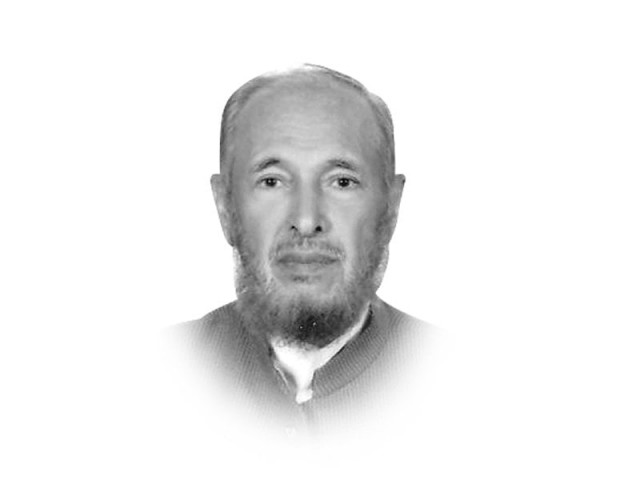Taliban delegation’s visit: are peace talk prospects better?
As situation sours after Trump's bombshell announcement of ending negotiations

The writer is a former interior secretary and a former ambassador
After President Trump abruptly called off the talks in early September, the Taliban leaders went to Moscow and then to Beijing to apprise the leaders of the two important regional countries of the inexplicable and unwarranted unilateral US action of terminating the year-long peace talks.
Some Taliban representatives have also reportedly gone to Iran on a similar mission.
The wholly unexpected announcement by Trump regarding the cancellation of the peace initiative took everyone by surprise. The decision caused deep disillusionment not only in the ranks of the Taliban, but in the regional countries that have been adversely affected by the long conflict.
Not only did President Trump throw a bombshell thereby ending the peace negotiations, he also declared his resolve to hit the Taliban harder than ever before. That intention was translated into reality as US warplanes began to drop bombs indiscriminately on populated areas, striking a group of farm labourers in Nangarhar and a wedding party in Helmand province. Dozens of innocent civilians were killed in the gruesome attacks, including women and children.
The Taliban also, in desperation, began to mount more lethal attacks on government forces and installations. Many civilians lost their lives in these attacks too.
The rising spiral of violence created more fear and anxiety in a population that has been traumatised by an unending and brutal conflict.
The visit of the Taliban leaders has to be seen in the perspective of whether there is any hope for resuming the stalled talks or not. More than the Taliban leaders’ presence in Islamabad, the spotlight was on the visit of Zalmay Khalilzad, the US Special Envoy and chief negotiator of the Afghan peace process, because his arrival in Islamabad was seen as evidence of the US intention to resume the peace negotiations. Mr Khalilzad, besides meeting Pakistani leaders, also had two meetings with the Taliban delegation.
Although nothing was officially revealed regarding any real effort to restart the peace negotiations, there was a feeling of optimism in the air because the only apparent rationale for Khalilzad’s visit is a desire to restart talks with the Taliban.
The US is in a dilemma. The war in Afghanistan that has gone on for 18 years can go on indefinitely. There is no end to this conflict as there was no goal to accomplish when the US unleashed this war. The US fears that in the event of its withdrawal, a vacuum will be created for China to begin dominating the region on the back of a successful completion of its iconic Belt and Road Initiative project. But the march of times cannot be reversed by the fears of a global power. The ground realities are such that the US has to acquiesce in a political scenario in the region in which China has to be seen as a major actor both militarily and economically.
There is a silver lining for the US in this situation. If it chooses to depart militarily from Afghanistan following an agreement with the Taliban, it could continue to wield influence in the area in terms of its huge political and economic clout and it’s potential to extend vital economic and technological assistance. The US must decide which side of the spectrum it wishes to be on. If it continues to hang on to its support for a Kabul government that has lost legitimacy, power, and control, it will lose the sympathy and support of the people. Not only that, but it will find itself isolated in the scheme of things in the larger political landscape of this whole region. No matter who gets elected as president in the Afghan elections, the electoral process has lost credibility because of a depressingly low voter turnout.
The task for the US is by no means easy. It has to navigate an extremely complex path of political manoeuvering. An elected president — regardless of how few people voted for him, has to have some role in a transition to a new system. On the one hand, the US would be required to show some consideration for an institution that it has helped create and on the other, it has to cater to the demands of the Taliban for a lion’s share in a government they would hope to dominate.
Perhaps the old Afghan institution of a Loya Jirga has to be convened to break the impasse. Traditionally and historically, the Loya Jirga has never failed to address and seek viable solutions to the complex constitutional imbroglios Afghanistan faces. The Loya Jirga will not fail this time round either.
The recent prisoners swap between the US and the Taliban is a good omen for the resumption of dialogue. Because many bitter lessons have been learnt and because the lingering chaos could lead to a messier situation, there is an expectation that once the talks begin they would not end without a tangible and viable outcome.
Let us hope this optimism materialises.
Published in The Express Tribune, October 10th, 2019.
Like Opinion & Editorial on Facebook, follow @ETOpEd on Twitter to receive all updates on all our daily pieces.













COMMENTS
Comments are moderated and generally will be posted if they are on-topic and not abusive.
For more information, please see our Comments FAQ